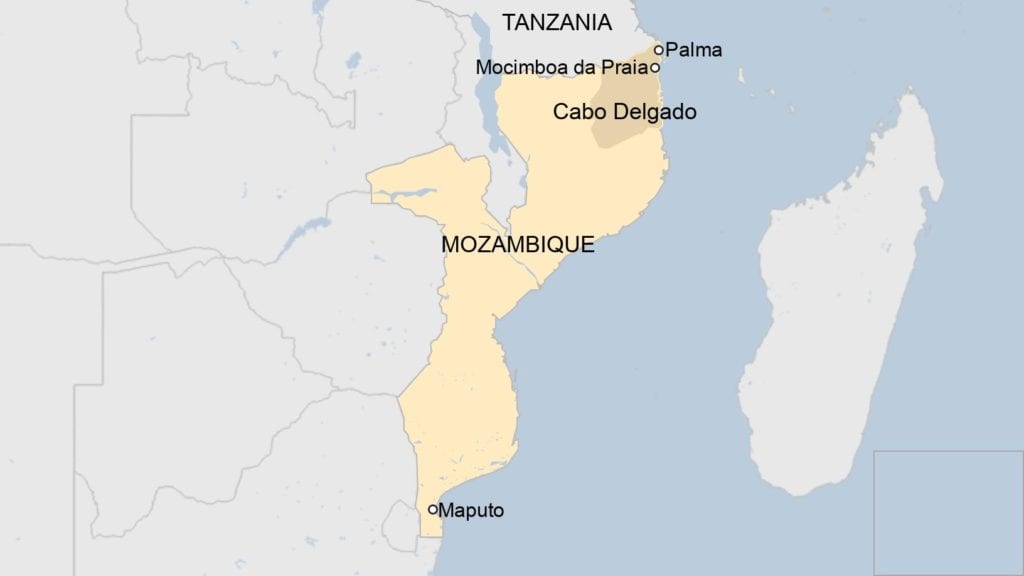5 min read
Why the Conflict in Cabo Delgado Matters for Eastern Africa
By: HORN Institute on April 28, 2021 at 8:00 AM

Northern Mozambique’s Cabo Delgado Province once again grabbed international headlines in late March 2021 after a local militant group aligned with radical Islamist ideology seized the key port town of Palma.
The group, which has been operating in the region since 2017, goes by several names: Ansar al-Sunna, the Swahili Sunna, ISIS-Mozambique (as it is known in the US), al Shabab (as it is known locally), and Ansar al-Sunna Wa Jamma (ASWJ). ASWJ is primarily driven by local grievances, particularly frustration surrounding the marginalization of northern Muslim communities at the hands of the Mozambican government and foreign companies. However, ASWJ does employ Islamist rhetoric as an organizing tool and has sworn allegiance to the Islamic State. Intensifying violence in Cabo Delgado will have an impact on the entire region, exacerbating the existing humanitarian crisis, harming efforts to increase foreign investment in the region, and providing a base from which Islamist ideology may radicalize other vulnerable youth in neighboring countries.
When evaluating response options, it is critical that policymakers consider key lessons from previous efforts to handle similar groups in Sub-Saharan Africa. Namely, that similar groups have exploited border areas to effectively operate and evade authorities and that highly militarized approaches to deal with them often exacerbate the problem.
Conflict Drivers and the Formation of ASWJ
Although ASWJ draws ideological inspiration from outside of Mozambique, the group is driven primarily by local grievances. ASWJ’s radicalization and recruitment efforts found fertile ground (particularly among the youth) because of Cabo Delgado’s history of poverty, political marginalization, and the lack of local benefit from natural resource revenues. As various analysts have pointed out, despite having huge deposits of natural resources, particularly oil, gas, and rubies, the residents of Cabo Delgado Province have received little revenue from extraction efforts. They have also long been politically marginalized by the Mozambican government. Residents assert that the government has paid little attention to its citizens and development efforts in the province. The poor socio-economic and political situation has contributed to the spread of Islamist rhetoric, which advocates for the establishment of Islamic rule and Sharia law that is independent from the secular state institutions that many feel have exploited them for years. ASWJ members are reported to draw inspiration from the radical teachings of the Kenyan cleric Aboud Rogo, whose influence has played a significant role in radicalization along the East African Coast.

A map showing the geographical location of Cabo Delgado (Credit: BBC)
While the group is referred to locally as al Shabab, there is no evidence of direct links to the al Qaeda-affiliated militant group in Somalia. ASWJ swore allegiance to the Islamic State in mid-2019. The Islamic State claimed responsibility for the fatal attack on March 29, 2021, that killed about 55 people in the town of Palma. However, the actual ties between the group (in terms of operational support) remain “murky” and a subject of ongoing debate.
Regional Implications of Intensifying ASWJ Activities
The destabilizing impact of the ongoing conflict in northern Mozambique is already and will continue to be felt in the wider region. Nearly 700,000 people have been displaced by the violence since its onset in October 2017. As the violence continues, this number will continue to grow, deepening the existing humanitarian crisis. Mozambique’s regional partners may be called upon to either host refugees or provide support to government authorities as they attempt to manage the crisis. The ongoing conflict is also detrimental to the region’s efforts to attract foreign direct investment. Cabo Delgado is home to a USD 20 billion liquified natural gas (LNG) project led by Total, a major French oil and gas company. The construction of the project, which is supposed to be completed in 2024, has been halted due to the worsening violence. The instability in Mozambique and its impact on the LNG project may damage investor confidence in the region as a whole. Additionally, the Islamist ideology that the young militants of ASWJ subscribe to is gaining popularity along the entire Swahili Coast (from Southern Somalia to Northern Mozambique). This ideology, and the Swahili-speaking extremist clerics who promote it, has the potential to radicalize other vulnerable populations in the region, particularly in Muslim youth in southern Tanzania.
Lessons from Other Responses to Islamist Insurgencies in Africa
The West African experience with Boko Haram and the Horn of Africa’s experience with al Shabab offer key lessons for policymakers working to tackle the emerging insurgency in Mozambique. First, both highlight the ability of jihadists to move across borders to conduct operations. For example, Boko Haram, although based primarily in Nigeria, launched attacks across the Lake Chad Region. Similarly, al Shabab has successfully attacked targets in Kenya and Uganda. It has also attempted to conduct attacks in Ethiopia. Mozambique and its regional partners should work to develop a framework both for the sharing of intelligence as well as to resolve jurisdictional issues should the insurgency expand into neighboring countries. Both experiences also demonstrate the dangers of a highly militarized approach to dealing with jihadists. The heavy-handed approach that drove Nigeria’s early efforts to deal with Boko Haram proved ineffective at degrading the group’s capacity and “deeply alienated” the civilian population in the region. In Somalia, despite a decade-long, highly militarized counterinsurgency operation, al Shabab was able to collect more revenue than the Somali government this past year. The Mozambican government must avoid a similarly ham-fisted response and ensure it incorporates community outreach and assistance into its approach.
Related Posts
Cabo Delgado Conflict: Escalating tensions and..
Since 2017, the ongoing conflict in Mozambique’s northernmost province, Cabo Delgado, has cost the..
Mozambique Could Become Africa’s Next Piracy Hot..
On March 24, Ansar al-Sunna, a militant group linked to the Islamic State, launched a bloody attack..
Is Mozambique Safe?
Is Mozambique safe?




